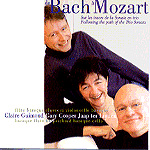When a flute is involved, you have to wonder whether there must be a tradeoff between the authentic sound of period-performance and a reasonably pleasurable listening experience. As if on a recording its voice isn’t penetrating enough without careful engineering, listeners to performances involving the “flauto traverso” almost always must endure its obstinate resistance to the ideal of true intonation. Why can’t anyone play these things in tune? Obviously, that’s why the “modern” flute was invented, but its metallic-toned reliability comes with a loss of the reedy, darker, mellower resonance of wood that makes the baroque flute’s timbre so attractive.
And as we hear on this program of sonatas, even the best players have trouble taming the instrument’s under-pitch tendencies. Claire Guimond is one of the world’s more accomplished soloists, and certainly her performances here are far more accurate than Janet See’s 1991 traversal of Bach’s complete flute sonatas on Harmonia Mundi, renditions that would be a first choice were it not for the excruciatingly pitch-challenged solo lines.
Guimond’s idea was to offer a sort of trip along the “path of the Trio Sonata”, from J.S. Bach to Mozart. But the concept’s appeal is undermined by weak material; except for Bach’s oft-performed B minor masterpiece, the rest of the program consists of average or even minor works, including Mozart’s juvenile (he was eight) F major sonata, and a transcription of an organ piece that leaves you wondering, “Why?” The intent here is undoubtedly sincere and the performances are reasonably solid. The live acoustic gives generous attention to the flute and places the harpsichord in a detail-less, mushy background. Fans of the flute may care about this, but I’d guess the performers enjoyed the experience more than you will.
































